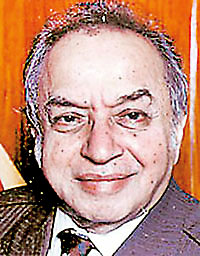Sunday Times 2
ACS Hameed: A symbol of communal harmony
The late Foreign Minister Abdul Cader Shahul Hameed, who passed away on September 3, 1999, was much loved by members of all communities for his dedicated service to the country. Even today, he is remembered as a symbol of communal harmony and an example to be emulated by today’s politicians who thrive on racist politics.
 For the uninterrupted 39 long years, from 1960 to 1999, Marhoom Hameed represented the Akurana electorate, which was later re-demarcated as Harispattuwa. He continued to win the electorate where the Muslim population was only 14 percent, because the Sinhalese overwhelmingly voted for him, although there were many Sinhalese candidates.
For the uninterrupted 39 long years, from 1960 to 1999, Marhoom Hameed represented the Akurana electorate, which was later re-demarcated as Harispattuwa. He continued to win the electorate where the Muslim population was only 14 percent, because the Sinhalese overwhelmingly voted for him, although there were many Sinhalese candidates.
At national level politics, he was an ardent supporter of the late President J.R. Jayewardene and stood by him during good times and bad times. JR also, in turn, rewarded him for his loyalty by appointing him as the first foreign minister — a post held by prime ministers since independence in 1948. His political life was also a shining example for most Muslim politicians who, in later years, formed their own political parties and paved the way for communal politics and the present sorry state of affairs.
In Parliament, Hameed always made valuable contributions on almost every subject. This was possible because he was a voracious reader. He was also entrusted with the task of preparing the party manifesto for the general elections.
As the foreign minister between 1977 and 1987, he was the chairman of the Non-Aligned Movement’s Ministerial Conference and was deeply involved with the resolution of many international problems, including the US-Iranian crisis. He played this international role, while looking after the interests of his constituency.
With troubleshooting being his forte, he was also associated with many delicate negotiations with NAM nations.
He played a crucial role in the peace process between the Liberation Tigers of Tamils Eelam and the government with the aim of bringing about a solution to the ethnic conflict. His role in this regard was highlighted in the book titled “The Will to Freedom” by Adele Balasingam, wife of LTTE chief theoretician Anton Balasingham.
On his role in the peace talks, Adele, in her book, said;
“Hameed acted with patience in the course of peace talks. He was a man of stature and planned his argument as if he was playing a game of chess.”
He was responsible for opening up Sri Lankan diplomatic missions in many countries, including Saudi Arabia, Kuwait, Bahrain, Oman, Qatar, Libya, the United Arab Emirates, Singapore, Malaysia and South Korea. Thanks to these missions hundreds of thousands of Sri Lankans got employment in these countries.
Recognising his contribution as foreign minister in foreign relations, Hameed was honored with an honorary doctorate in 1978 by the Hank University in South Korea followed by an honorary doctorate by the Sri Jayewardenepura University.
In President Ranasinghe Premadasa’s government, he held the post of Minister of Higher Education, Science and Technology, and later, as Minister of Justice and Highesr Education Planning.
Despite his busy schedule, he managed to author many books such as The Foreign Policy Perspective of Sri Lanka, In Pursuit of Peace, On Nonalignment and Regional Co-operation, The Owl and the Lotus and Spring of Love and Mercy.

